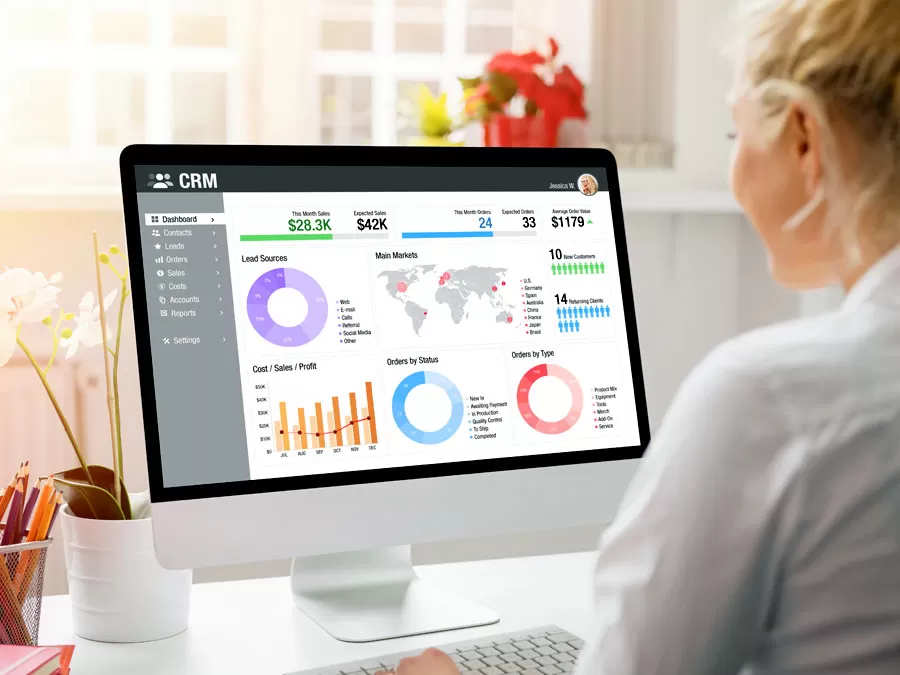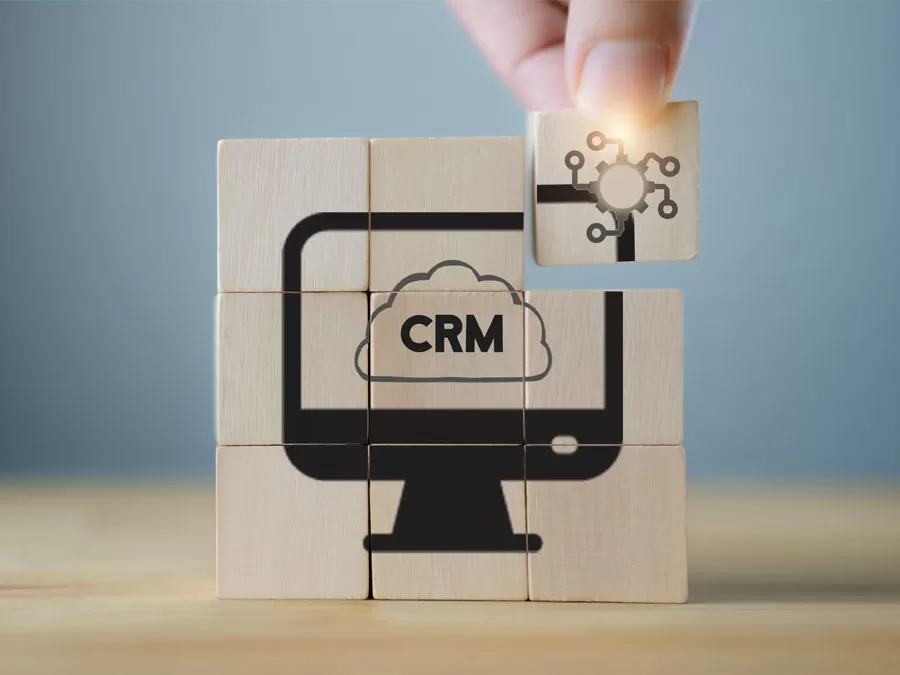A Customer Relationship Management (CRM) system serves as the backbone of your customer interactions, helping you understand their needs, preferences, and behaviors to deliver exceptional experiences.
However, as technology evolves rapidly, sticking to an outdated CRM tool can lead to dire consequences that hinder your business’s growth and success.
In this comprehensive blog, we’ll explore the five critical consequences of using an outdated CRM tool and discuss how it impacts your business.
Moreover, we will highlight the benefits of upgrading to the best CRM tools and delve into CRM implementation best practices to ensure your CRM system remains a powerful ally in your business journey.
-
Increased Operational Inefficiencies
One of the primary drawbacks of sticking with an outdated CRM tool is the increased operational inefficiencies it brings to your business. As your business evolves and expands, so do your customer relationship management requirements.
An outdated CRM may lack the latest features and functionalities needed to keep up with the demands of your growing customer base. Consequently, your team may face challenges in accessing crucial customer data, experience slow response times, and struggle to integrate the CRM with other essential business tools and systems.
As a forward-thinking business owner, you know that optimizing your operational efficiency is vital for staying competitive. By adopting the best CRM tools available in the market, you can enjoy seamless integration with other applications, ensuring smooth data flow and empowering your teams to make data-driven decisions efficiently.
Embracing CRM implementation best practices to the best CRM tools allows you to optimize your operational processes and enables your team to focus on building strong, lasting customer relationships that drive business growth.
-
Reduced Data Accuracy and Reliability
Data is the lifeblood of your customer relationship management efforts. An outdated CRM tool may compromise the accuracy and reliability of your data, posing serious risks to your business.
Outdated systems are more susceptible to data loss, corruption, and duplication, leading to inconsistencies in customer information. This can result in poor customer interactions, erroneous decision-making, and a lack of trust in the data across your organization.
Upgrading to the best CRM tools with robust data management capabilities ensures that your customer data remains accurate, up-to-date, and easily accessible to your team. By following CRM implementation best practices, you can seamlessly migrate your data, ensuring data integrity throughout the process.
With reliable data at your fingertips through the best CRM tools, you can make informed business decisions and provide personalized experiences that delight your customers, fostering trust and loyalty.
-
Hindered Customer Relationship Management
Effective customer relationship management is a cornerstone of business success. An outdated CRM tool often lacks the automation and intelligent customer engagement features that modern businesses rely on to build strong connections with their customers.
This can significantly hinder your team’s ability to keep track of customer interactions, follow up on leads, or identify upselling opportunities.
To excel in customer relationship management, it’s essential to invest in the best CRM tools equipped with advanced automation capabilities. Through CRM implementation best practices, you can configure your CRM system to send personalized communications, automate follow-ups, and nurture leads through their buying journey.
This level of engagement fosters customer loyalty and advocacy, driving higher retention rates and contributing to overall business growth. It only goes to show how far the best CRM tools can take you.
-
Security and Compliance Risks
Data security and regulatory compliance are of utmost importance. An outdated CRM tool may lack the latest security features and patches, making it vulnerable to potential data breaches and cyber-attacks.
The consequences of a security breach can be severe, damaging your brand reputation, eroding customer trust, and leading to legal repercussions. A lack of CRM implementation best practices and updates can cause these to happen.
Upgrading to the best CRM tools ensures that your customer data is protected by state-of-the-art security measures. Cloud-based CRM solutions, for example, offer robust encryption and continuous security updates, safeguarding your data against potential threats.
By adhering to CRM implementation best practices, you can implement secure data access protocols and data backup strategies to minimize risks further, ensuring the safety of your customers’ valuable information.
-
Limited Mobility and Remote Access
Mobility is key to delivering exceptional customer service on the go. Outdated CRM tools may lack mobile-friendly interfaces, restricting your team’s ability to access critical customer information while in the field or working remotely.
On the contrary, the best CRM tools come with user-friendly mobile applications that empower your team to access customer data, update records, and respond to customer inquiries in real-time, regardless of their location.
Following CRM implementation best practices ensures a seamless integration between your CRM system and mobile devices, enabling your team to provide consistent and efficient service, even outside the office.
Benefits of Upgrading to the Best CRM Tools
Delivering exceptional customer experiences is the key to success in today’s competitive business landscape. Upgrading to the best CRM tools offers a multitude of benefits that can transform the way you interact with your customers and drive your business forward. But of course, embodying CRM implementation best practices also helps.
-
Enhanced Customer Experience and Satisfaction
Upgrading to the best CRM tools improves your ability to provide personalized experiences, resulting in higher customer satisfaction. By leveraging customer insights and engagement data, you can tailor interactions to meet individual preferences, creating a positive and memorable experience for each customer.
With a comprehensive understanding of your customers and CRM implementation best practices, you can anticipate their needs and exceed their expectations at every touchpoint, fostering long-lasting relationships and customer loyalty.
-
Increased Sales and Revenue
A modern CRM system equipped with advanced sales automation features and CRM implementation best practices can streamline your sales processes, enabling your team to manage leads more effectively and close deals faster.
With enhanced pipeline visibility and lead nurturing capabilities, your sales team can capitalize on more opportunities, driving increased revenue for your business. The best CRM tools also offer forecasting and analytics functionalities, enabling you to identify growth opportunities, optimize sales strategies, and achieve higher profitability.
-
Improved Team Collaboration and Efficiency
The best CRM tools offer collaborative features that allow your teams to work together seamlessly. Through shared data and real-time updates, teams can collaborate more effectively, ensuring everyone is on the same page and making informed decisions based on the latest information.
By centralizing customer data and interactions, the best CRM tools eliminate silos within your organization, promoting a culture of collaboration and driving collective success. Having CRM implementation best practices can also help.
-
Enhanced Customer Insights and Analytics
A robust CRM system provides valuable customer insights and analytics that empower you to understand customer behavior, preferences, and pain points. These insights guide your business strategies and enable you to refine your offerings to better meet customer needs.
With real-time data and customizable reports, the best CRM tools help you track key performance indicators, measure the effectiveness of your marketing campaigns, and identify trends that inform your business decisions. Make sure to have CRM implementation best practices to better achieve this outcome.
CRM Implementation Best Practices
Implementing a new CRM system is a significant undertaking that can have a profound impact on your business.
To ensure a successful implementation and maximize customer relationship management system benefits, it is crucial to follow best practices that guide you in the right direction.
-
Define Clear Objectives and Goals
Before implementing a new CRM system, define clear objectives and goals. Understand what you want to achieve and align your CRM strategy with your overall business objectives. Whether it’s improving customer retention, increasing sales productivity, or enhancing customer service, having well-defined goals will drive your CRM implementation in the right direction.
-
Involve Key Stakeholders
Involving key stakeholders, including your team members and department heads, ensures buy-in and a better understanding of the CRM’s benefits and functionalities. By involving the end-users in the decision-making process, you can address their needs and concerns, fostering a sense of ownership and enthusiasm for the new CRM system.
-
Data Migration and Integration
Carefully plan and execute data migration to ensure a smooth transition from your old CRM to the new one. Data migration is a critical aspect of CRM implementation, and it’s essential to ensure data integrity and compatibility with existing systems. By following best practices for data migration, you can minimize downtime and data discrepancies during the transition.
-
Provide Comprehensive Training
Offer comprehensive training to your team members to ensure they are well-versed in using the new CRM system. Training is crucial for successful adoption and utilization of the CRM’s features. Conduct hands-on training sessions, provide user guides, and offer ongoing support to address any questions or challenges that arise during the transition period.
-
Monitor and Measure Performance
Continuously monitor and measure the performance of your new CRM system. Analyze key metrics to assess its effectiveness and identify areas for improvement. Regularly gather feedback from your team and customers to gain insights into the CRM’s impact on your business processes and customer satisfaction.
By monitoring performance, you can make data-driven decisions, optimize your CRM strategy, and ensure that your CRM system remains aligned with your business objectives through CRM implementation best practices.
Outsourcing for Better CRM
Outsourcing customer service to a third-party provider with an updated CRM system can be a game-changer for your brand. As competition intensifies in the business landscape, customer experience has become a critical differentiator.
By leveraging the expertise of a specialized customer service provider with the best CRM tools and CRM implementation best practices, your brand can gain a competitive edge and unlock numerous benefits.
-
Enhanced Customer Experience
A key advantage of outsourcing to a third party with an updated CRM system is the ability to deliver a seamless and personalized customer experience. An advanced CRM system, complete with CRM implementation best practices, enables the service provider to centralize and analyze customer data effectively.
With a comprehensive view of customer interactions, purchase history, preferences, and pain points, the customer service team can engage customers in a more tailored and relevant manner.
By understanding customer needs and anticipating their concerns, the third-party provider can create positive interactions that leave a lasting impression on customers, boosting brand loyalty and advocacy.
-
Access to Expertise and Technology
Outsourcing to a third party with an updated CRM system provides your brand with access to a team of skilled customer service professionals who are well-versed in utilizing the latest technology. The service provider’s agents are trained in CRM implementation best practices, ensuring efficient handling of customer inquiries and resolution of issues.
Additionally, the updated CRM system equips the team with automation capabilities, allowing for quicker response times and proactive customer engagement. Leveraging the expertise and technology of the third-party provider empowers your brand to offer top-notch customer service without the need for extensive in-house resources and training.
-
Scalability and Flexibility
As your business grows or experiences seasonal fluctuations in customer demand, outsourcing to a third party with an updated CRM system provides the scalability and flexibility needed to adapt to changing needs.
The service provider can quickly adjust staffing levels and resources to handle high call volumes during peak periods, ensuring that your brand maintains excellent customer service levels without compromising quality. This scalability allows your brand to remain agile and responsive, catering to customer needs regardless of the business’s size or fluctuations in demand.
-
Cost Savings and Efficiency
Outsourcing customer service can lead to significant cost savings for your brand. Partnering with a third-party provider means avoiding upfront investments in CRM technology and infrastructure. Instead, you pay for the service based on a predetermined agreement, making it a more cost-effective solution.
Additionally, the updated CRM system enhances operational efficiency and agent productivity, resulting in quicker issue resolution and reduced call handling times. As a result, your brand can optimize costs while delivering superior customer service.
-
Focus on Core Competencies
By outsourcing customer service, your brand can focus on its core competencies and strategic initiatives. Delegating customer support responsibilities to a specialized provider with an updated CRM system frees up internal resources, allowing your team to concentrate on product development, marketing, and other critical areas.
This strategic allocation of resources enables your brand to maintain a competitive edge in the market and drive innovation while leaving the customer service aspect in the hands of experts. Of course, this will be possible only with CRM implementation best practices.
-
Improved Data Security and Compliance
Outsourcing to a third party with the best CRM tools can enhance data security and compliance for your brand. Reputable service providers invest in robust security measures, such as encryption, firewalls, and secure data storage, to protect customer information from potential breaches.
Moreover, they adhere to industry regulations and standards, ensuring that data handling processes are compliant with relevant laws. The third-party provider’s commitment to data security and compliance, alongside CRM implementation best practices, provides peace of mind to your brand and builds trust with customers.
Using an outdated CRM tool can have significant consequences for your business. From increased operational inefficiencies to compromised data accuracy and hindered customer relationship management, an outdated CRM system may hamper your business growth and success.
Upgrading to the best CRM tools offers a multitude of benefits, including enhanced customer experiences, increased sales, improved team collaboration, and access to valuable customer insights. By following CRM implementation best practices, you can ensure a successful CRM upgrade and unlock the full potential of your customer relationship management system.
Embrace modern technology and make customer relationship management a key pillar of your business strategy to thrive in today’s competitive market. Remember, the key to success lies in delivering outstanding customer experiences, and a robust CRM system is your ultimate ally in achieving this goal.
Open Access BPO leverages customer service technologies, including the best CRM tools to stay on top of the outsourcing industry. We integrate this technology seamlessly with our operations which are driven by the best and most diverse workforce you could possibly work with.
With our diversity and use of technology, we’re able to deliver high-end customer service through multiple channels and in more than 30 languages. Brands have already seen what we can do and continue to trust us, so contact Open Access BPO today to find out what we can do for your brand.
















